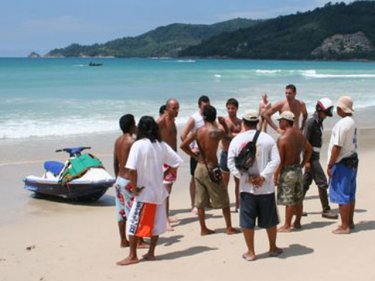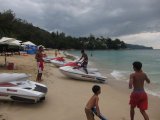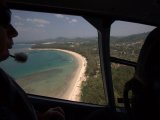Five visitors from the Ukraine hired three Pattaya jet-skis yesterday for 30 minutes at 700 baht each and damaged all of them, according to jet-ski owner Sarayut Jemad, who wanted a total of 72,000 baht for repairs.
After the intervention of Tourist Police, the cost was reduced to 30,000 baht.
Debate continues about the future of jet-skis in Pattaya and on Phuket, where authorities appear powerless to stop numbers from growing or spreading to beaches where they are banned.
Some of Phuket's honorary consuls believe that there have been so many scams and serious injuries involving jet-skis and speedboat parasailers that they should be banned on Phuket, as they are in the neighboring ''green'' provinces of Krabi and Phang Nga.
One compromise solution would be to push the jet-skis and speedboats offshore to operate from pontoons, well away from swimmers on the beaches where zoning has always failed.
Boracay, a popular holiday island in the Philippines, uses the pontoon system. David Field, an Australian lifesaving expert currently training Boracay lifeguards, believes the idea would work well on Phuket.
''During high season there would be no problem at Patong,'' he told Phuketwan. ''During low season over near Paradise beach in the lee of the headland and out of the south-west monsoon it would still work.''
Phuripat Theerakulpisut, Chief of Phuket's Marine Office 5, told Phuketwan this week that he thought waves would make the pontoon system unworkable.
However, given the choice between clearing all jet-skis off Phuket or having them operate from offshore pontoons, jet-ski operators may be persuaded to accept the pontoon concept.
Authorities in Bangkok are understood to be considering requests from several countries to complete a Governor's promise made seven years ago to rid Phuket of jet-skis.
Far from the jet-skis being phased out as in the orginal promise, Phuket today has more jet-skis than ever.
As the number of tourists swimming at Phuket beaches seems certain to continue to grow, more scams and injuries are likely.
Last week, a Russian tourist swimming at Kata was struck and badly injured by a speedboat, with authorities unwilling to seek compensation or even reprimand the wayward driver.
On Boracay, Mr Field sees a system that works and allows swimmers to use the beach while jet-skis operate at a safe distance offshore.
''Currently the high season wind comes from the north so off the south-facing white beach, approximately one kilometre to 1.5 kilometres, there are floating salas where the guests are taken for their turn,'' he says.
''Jet-skis are confined within a buoyed area and all riders must ride in same direction.
''Parasailers have tandem and triple seats. A proper tow setup with winches on boats lets out the parasail, so there's no dangerous fixed towline and daredevil Thai boys hanging in the rigging, as happens on Phuket.
''From Boat Station 1, boats regularly leave the beach and take guests out to the floating pontoons. Touts recruit and take guests to Boat Staion 1, where they pay.
''Snorkelling and bubble dives leave from here as well
''Dive boats leave the beach from Station 1 and Station 3 - Station 2 is a swimming only area.''
Putting pontoons offshore would enable jet-skis to expand to beaches where they are now banned, thus increasing their numbers as the number of tourists coming to Phuket continues to grow, but ensuring the better safety of all swimmers at all beaches.











This idea has one basic flaw. It does not get rid off the crooks that are ruining my favorite holiday location.
Licence and regulate the jet ski and parasail operators and some things might improve. My solution is to avoid any beaches the jet skies and parasails operate on and believe me there are lots of lovely, out of the way beaches that can still be enjoyed on Phuket
Posted by arthur on December 9, 2011 11:17